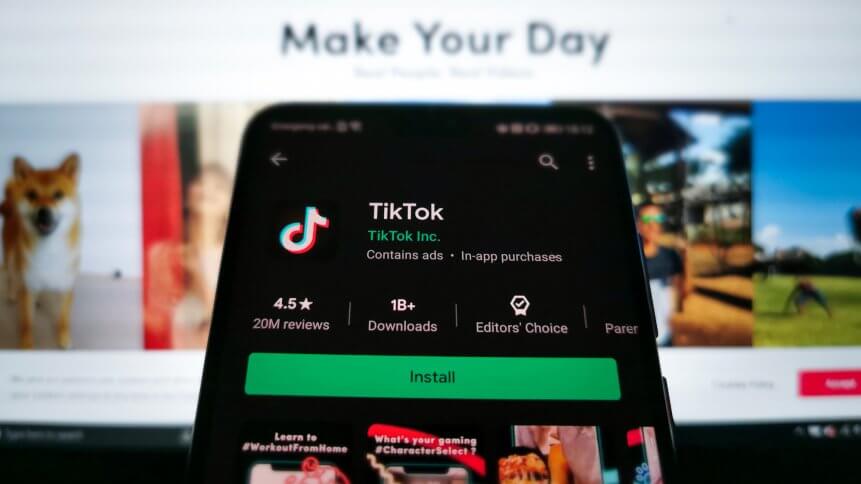TikTok shifts towards online education market

- TikTok has shot to dizzying heights amid a spike in social media usage during lockdown
- Now, it’s eyeing the online education market as it seeks to leverage a trend of ‘micro-learning’
If Zoom is the new poster child of remote working, social media app TikTok has risen to stardom in the world of lockdown entertainment.
Downloaded more than 2 billion times with 315 million installs in Q1 this year, the Chinese video-sharing app, founded in 2012, has become one of the most popular apps in the world – it’s even shed its association with Gen Zs alone, seeing a nearly 20% uptick in regular usage by millennials since the outbreak.
If you haven’t tried your hand at it, users create 15-second clips set to music or soundbites, which they can overlay with special effects. But you don’t have to be a user to see its success; from the ubiquitous TikTok dance clips, to viral sketches, and even ICU nurses, the reach of TikTok’s user-generated content goes far beyond its own platform.
Now, the company owned by Chinese multinational internet giant ByteDance has announced a significant shift into the online education market, commissioning hundreds of experts and institutions to produce education content for its #LearnOnTikTok platform.
How to more cases than anybody in the world pic.twitter.com/VA9bPJiQ6i
— Sarah Cooper (@sarahcpr) May 15, 2020
Organizations – including universities and charities – as well as a handful of celebrities, will be among those paid to produce educational content for the platform, in what could spur a trend towards ‘micro-learning’, or small units of learning found online.
Pumping US$14.6 million into the project, the announcement indicates TikTok thinks it can break ground in the online education market, which offers alternative means and channels for education as schools and universities around the world look to be some of the last organizations to reopen.
“[…] Tiktok has quickly become a place people turn to when they want snack-sized entertainment,” said Rich Waterworth, Tiktok’s EU general manager. “Now we want to build on this strong foundation, bringing together entertainment and learning, offering our community a truly rich and diverse ecosystem of content.”
Social media usage has spiked during the pandemic, and apps are now increasingly used as news sources. According to the 2020 Reuters Digital News Report released this week found that 43% of 16-24 year olds accessed social media as a source of COVID-19 related information in the past few months – 6% turned to TikTok specifically.
Waterworth said the platform had identified a growing interest in educational videos, with more than 7 billion views of the hashtag #LearnOnTikTok; “We’re using this investment to seed the educational category broadly,” he said.
YOU MIGHT LIKE

How EdTech can help mitigate economic disaster
“Going forward, LearnOnTikTok is about us investing in partners and content creators with a breadth of professional content […] We think this is about applying the power of TikTok to learning: the effects, the audio, the transitions, the tools that make it so engaging and fun, to make people enjoy learning,” he said.
Even before COVID-19, there was already high growth and adoption in education technology, with global edtech investments reaching US$18.66 billion in 2019 and the overall market for online education projected to reach $350 Billion by 2025.
Worldwide there are currently more than 1.2 billion children in 186 countries affected by school closures due to the pandemic. Whether it is language apps, virtual tutoring, video conferencing tools, or online learning software, there has been a significant surge in usage since COVID-19.
This show of intent from TikTok to has been linked to the appointment of former Disney’s direct-to-consumer head Kevin Meyer, who oversaw the launch of new streaming service Disney Plus, which now has more than 50 million subscribers.
Enders Analysis’s Jamie MacEwan, told the BBC Meyer could lead the social media app in a new direction: “TikTok really wants to broaden its appeal and we are going to see more structured, more premium content going forward.
“We know [Meyer] as a deal-maker for content and we’re sure to see more partnerships going forward.”
Educational content could also be attractive to advertisers who are looking for a new way to cut through the noise of online video and display, or an expensive and risky influencer marketing industry. Brands and organizations can look to short ‘micro-learning’ segments to engage audiences and provide value, or even to run recruitment campaigns for a younger generation.









